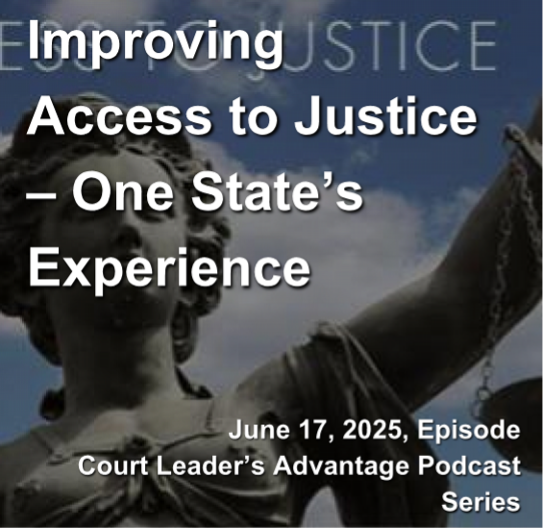September 19th Court Leader’s Advantage Podcast Episode
As court leaders, we are inundated with statistics and research. We have all been taught to have a healthy skepticism of statistics. We are given advice that includes: ask questions, go to the source of the research, and expose the assumptions behind the analysis. We have seen what happens when research is not properly evaluated. As a consequence, we are compelled to ensure that statistical analysis is objective and unbiased, valid and reliable, able to be replicated, and relevant to the work of your court.
Having a healthy skepticism is all the more important in this day and age of polarizing misinformation. Most of us have heard that old joke “73.6% of all statistics are made up on the spot.” We don’t want to be the one who is naïvely hooked by questionable statistical research. This advice is all so easy to give, but just how do we hone our critical thinking skills?
Imagine this common scenario, you are in a session with 500 attendees at a national conference. The presenter describes an exciting but controversial concept. At some point, that presenter voices that time-worn introduction “as studies have clearly shown . . .” How do you, as a critical thinker, react? How do you overcome some of the very real logistical issues this scenario presents? For example:
- In the Q&A at the end of the session, do you stand and challenge the presenter to describe the referenced statistical research? Many find this kind of challenge awkward or possibly even rude.
- Do you simply assume someone else in the audience will assess those studies and get back to you?
- Do you spend the time to locate the studies and try to understand them? What if you are curious about the topic? Do you start to think that it is a drain on your work time?
- What if you actually locate the studies and spend the time analyzing them. You end up with some legitimate questions. The sample size seems small or the consultants doing the evaluation were paid by the very program they were evaluating. Do you tell your judges; do you tell your fellow professionals in other courts? How do you do that?
- Or do you just regress into becoming generally negative about all information and default to Mark Twain’s popular adage, there are “lies, damn lies, and statistics”?
This month we’re looking at how we can remain savvy critical thinkers about statistics without ending up cynical and jaded.
Today’s Panelists
- Rick Pierce, Judicial Programs Administrator for the Pennsylvania Administrative Office of the Courts
- Cheryl Stone, Court Administrator for the Superior Court in Clark County, Washington
- Greg Lambard, Trial Court Administrator for the Superior Court in Middlesex Vicinage, New Brunswick, New Jersey
- Kent Pankey, Senior Planner, Judicial Services Department, for the Supreme Court of Virginia; and
- Liz Rambo – Trial Court Administrator for the Circuit Court in Lane County, Oregon.
Click here to listen to the podcast.
Leave a question or comment about the episode at clapodcast@nacmnet.org
Show Notes
Additional Resources

Rick Pierce
Rick Pierce is the Judicial Programs Administrator for the Administrative Office of Pennsylvania Courts. Rick has served in the field of court administration for the past twenty-nine years. Prior to his appointment at the Administrative Office of Pennsylvania Courts, Rick was the district court administrator for Cumberland County. Prior to his 4 ½ year tenure as court administrator, he was the assistant administrator for the 9th judicial district from 1988-1997.
As judicial programs administrator, he is responsible for implementation of programs and education in court administration at the general and limited jurisdiction court levels.
Rick served as the President for the Mid-Atlantic Association for Court Management for 2005-2006. Previously he has served on the MAACM advisory board from 1997-2005.
A graduate from Washington and Lee University, Pierce received his Masters in Public Administration from Shippensburg University in 1995. He has been an active member of the Pennsylvania Association of Court Management, (PACM) since its inception in 1989. He has served as a board member from 1994-2001, culminating in his presidency in 2000-2001.

Cheryl Stone
Cheryl Stone is currently the Court Administrator at the Clark County Superior Court in Vancouver, Washington.
Ms. Stone received a Bachelor of Science in Business Administration from Northwest Nazarene University, and is a Fellow of the Institute of Court Management (2012) with the National Center for State Courts (NCSC). Cheryl is a member of the Association of Washington Superior Court Administrators (AWSCA). She has been a member of the National Association for Court Management since 2008. Ms. Stone has appeared on the Center for Court Innovation’s New Thinking Podcast in February 2018. Her Fellows research was featured in the 2013 Spring edition of the Court Manager.
Cheryl has worked at the State Court Administrative Offices in Oregon and in both general and limited jurisdiction courts. Ms. Stone served on the Board for the Oregon Association for Court Administrators. She has worked with national, state, and local organizations on a variety of justice related projects. Ms. Stone currently serves as the NACM Director and Chair of the Membership Committee, the AWSCA Education Committee, Administrative Office of Courts (AOC) Institute for New Court Employees’, AOC Board of Judicial Administration Policy and Planning Committee, Statewide Blake Resentencing Workgroup, Department of Corrections Virtual Court Processes, and the NSCS Court Consulting Services Advisory Council.

Greg Lambard
Greg Lambard began his career with the State of New Jersey in 1991 after obtaining a BA in Criminal Justice from the University of Maryland and a MA in Criminal Justice from Rutgers University. He has served in the State Judiciary in various administrative roles and as a researcher/statistician. Additionally, he served two years in the New Jersey Governor’s Office, as Special Assistant to the State’s Chief Information Officer.
He has managed criminal courts, family courts, operations, and probation. He currently serves as the Trial Court Administrator for the Middlesex County Superior Court in New Jersey. He is a Past President of the Mid-Atlantic Association for Court Management and sat for two terms as a Director on the Board of the National Association for Court Management (NACM). Currently, he is the Secretary/Treasurer for NACM. He is a past member of the Advisory Committee to the National Center for State Courts’ (NCSC), Pretrial Justice and the State Courts Initiative, a past member of the National Judicial Opioid Task Force, a current member of the National Council of Juvenile and Family Court Judges’ DV Aware Taskforce, and a current member of the NCSC Court Consulting Services Division Advisory Council. He is also an Institute for Court Management certified instructor for caseflow and workflow management.

Kent Pankey
Kent Pankey is the senior planner in the Department of Judicial Planning, Office of the Executive Secretary, Supreme Court of Virginia (Virginia’s AOC), where he has worked since 2005. His current duties relate primarily to comprehensive projects involving strategic planning and performance measurement and management. He also staffs commissions and study groups, writes and edits reports and newsletters, and supports educational and technical assistance programs.
Admitted to the Virginia State Bar in 1988, Kent began his career at the National Center for State Courts (NCSC) where he held a variety of positions including staff attorney, departmental director, senior analyst, and head of the institutional review board. He advised judges, court administrators, legislative officials, media representatives. and others on a wide range of issues related to courts and their operation. Kent staffed or directed federally-funded, national-scope research projects on subjects including alternative dispute resolution, court coordination of family cases, the management of budget cutbacks, habeas corpus in state and federal courts, and futures studies and strategic planning in state courts. He was a contributing writer and for several years the managing editor for the annual Report on Trends in the State Courts and also the director of the Survey of Judicial Salaries.
Kent received a B.A. in Political Science from Hampden-Sydney College and a J.D. from the College of William and Mary. He is an ICM Fellow (Class of 1999) and a certified ICM instructor for the courses Accountability and Court Performance, Executive Decision Making, Leadership, Modern Court Governance, and Visioning and Strategic Planning. He has been a member of NACM since 1994 and has been an active member of the Education, Communication, and Membership Committees. Recently, he has been an editor for NACM’s new Media Guide and has authored or coauthored several articles for The Court Manager.

Liz Rambo
Liz Rambo is the Trial Court Administrator for Lane County Circuit Court. As the TCA for one of Oregon’s largest courts, Liz is responsible for all non-judicial court functions including budget, human resources, technology, facilities, and business efficiency. A 31-year court employee, Liz has a history of advocacy for the mission of the Oregon Judicial Department and the service that the Oregon Judicial Branch provides to the public. Liz has served on a variety of judicial branch leadership committees including as Chair of the Chief Justice Communications Committee, member of the Chief Justice Strategic Planning Committee, Law and Policy Workgroup, Internal Audit Committee, the Oregon eCourt Steering Committee.
For the last five years, Liz has worked closely with Lane County leadership toward building a new Lane County Courthouse and will continue to bring her years of experience to that ongoing project through design and construction. Liz graduated with high scholarship from Oregon State University with a BA in history and has an MBA from Portland State University. She is a long-time member of the National Association of Court Management and holds a Court Manager certification from the National Center for State Courts. Liz is the 2023 recipient of the Warren E. Burger award for excellence in Judicial Administration.




